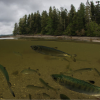In mid-September, an expert panel appointed by the federal Minister of Environment and Climate Change (the Panel) launched a public review of Canada’s environmental assessment processes (the EA Review). While the Panel and its secretariat have attempted to broadcast how the public and In
Environmental Law Alert Blog
Through our Environmental Law Alert blog, West Coast keeps you up to date on the latest developments and issues in environmental law. This includes:
- proposed changes to the law that will weaken, or strengthen, environmental protection;
- stories and situations where existing environmental laws are failing to protect the environment; and
- emerging legal strategies that could be used to protect our environment.
If you have an environmental story that we should hear about, please e-mail Andrew Gage. We welcome your comments on any of the posts to this blog – but please keep in mind our policies on comments.
No matter how many legally binding conditions are included in the Pacific Northwest liquefied natural gas (PNW LNG) project approval, the problem is that this industrial project is just in the wrong place.
Canada will soon have a national price on carbon. It will start at $10 per tonne of carbon in 2018, rising to $50 tonne in 2022 (equivalent to about 11¢ per litre of gas in 2022).
Over the summer, the Revitalizing Indigenous Law for Land, Air and Water (RELAW) team has been busy working with stories, and travelling to visit with participating Nations about Indigenous laws.
Mug shot: One of the gifts from the potlatch – “Raven Always Sets Things Right”
Make your voice heard for a permanent, comprehensive, legislated oil tanker ban before September 30, 2016.
[Update: 7 October 2016 - We received a response from Canadian Minister of Environment and Climate Change, Catherine McKenna, today acknowledging our open letter and confirming that "Ensuring transparency and accountability for pla
The jury is out: Canada needs a visionary new approach to assessing proposals that could impact the environment.
Next year Canada turns 150. What better present than a gift to the future: preservation of our outstanding heritage sites?
It's the end of the day and our shared office is hot and stuffy. My colleague on the RELAW project, Georgia, asks with all seriousness, “What are we going to do about Site C?”








